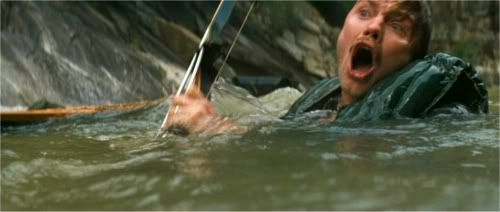My Newsweek Shadowland column this week, which is published in an abbreviated form in the print magazine, was adapted from a speech I gave last year at the University of South Alabama at the invitation of Sue Walker:By Christopher Dickey
Newsweek Web Exclusive
Updated: 12:44 PM ET Oct 17, 2007
Probably you know as much as you want to know about the most infamous scene in the 1972 movie "Deliverance," that homosexual rape by the riverside in the backwoods of Georgia—"Squeal piggy!"—it's been a source of hetero horror and sophomoric jokes ever since it first hit the screen 35 years ago. Warner Brothers has just released a deluxe anniversary DVD of "Deliverance," in HD or Blu-ray if you please, so the film's likely to have something of a revival in America's living rooms. Woe to any parents who fail to take the R rating seriously: that one nightmare sequence is so graphic, so carnal, so violent and humiliating that you cannot help but cringe, or laugh. (A lot of people laugh, nervously.) And you just cannot forget it.
Since my late father, James Dickey, wrote the novel "Deliverance" and the screenplay for the movie, I like to think there's more to the story than that, and indeed there is. But it was only last year, when I was asked by my friend Sue Walker at the University of South Alabama (yes, USA) to give a talk about the Middle East, which I normally write about, and also the making of the film “Deliverance,” which people seem to want to hear about, that I started thinking about the movie's particular relevance for the post-9/11 world. My old man and I disagreed about many things, but when I watched the re-released film again just recently, in light of current headlines, I realized just how well he'd tapped into those mind-sets that eventually helped plunge us into the Mesopotamian quagmire.
The basic plot of "Deliverance" is simple enough. Four suburbanites from Atlanta go canoeing up in the mountains. ("This is the weekend they didn't play golf," as the movie's original publicity campaign put it.) Then they find that the wild river and the people around it are much more dangerous than they'd ever bargained for. One of the men from Atlanta is raped, one is killed and the others learn to kill.
The instigator of the expedition is Lewis Medlock (Burt Reynolds in the movie), and while he talks about getting back to nature and testing himself against the wild, he's really more of a country-club Friedrich Nietzsche: a would-be "übermensch," or "superman," riffing on the 19th-century German philosopher's conceits, constantly training his body and mind to excel, reinventing himself to lead. His destiny—to survive against all odds—will be a triumph of his will. Or so he thinks.
In the end, though, it is not the übermensch who offers deliverance from the nasty, brutish horrors of the river and the men of the forest. It is the perfectly ordinary man, the just-getting-by guy, Ed Gentry (Jon Voight), who transcends himself to survive. He is not inspired by a vision of the future, he does not aspire to be tested by man and nature. He's motivated by fear, pure and simple, and his desire to return to his normal life without that fear.
In the early parts of the story, Ed thinks Lewis is a little nuts, but he's fascinated by the idea that Lewis might be right about—something—he's not sure what. Obsessions like those of Lewis Medlock can create their own charisma, inspiring fear while pretending to resist it. Untested ersatz fortitude often looks impressive. The other businessmen from Atlanta, the soft-spoken Drew (Ronny Cox) and porcine Bobby (Ned Beatty), think Lewis is a lot nuts. In fact, they think he's dangerous. And they're right.
Me, I think Lewis is Vice President Dick Cheney's closet fantasy of himself, and as such, a sort of model for the Bush administration as a whole. And Ed, he's about the rest of us, just scared and trying to get by. And the river? That's the war in Iraq. ... (more)













